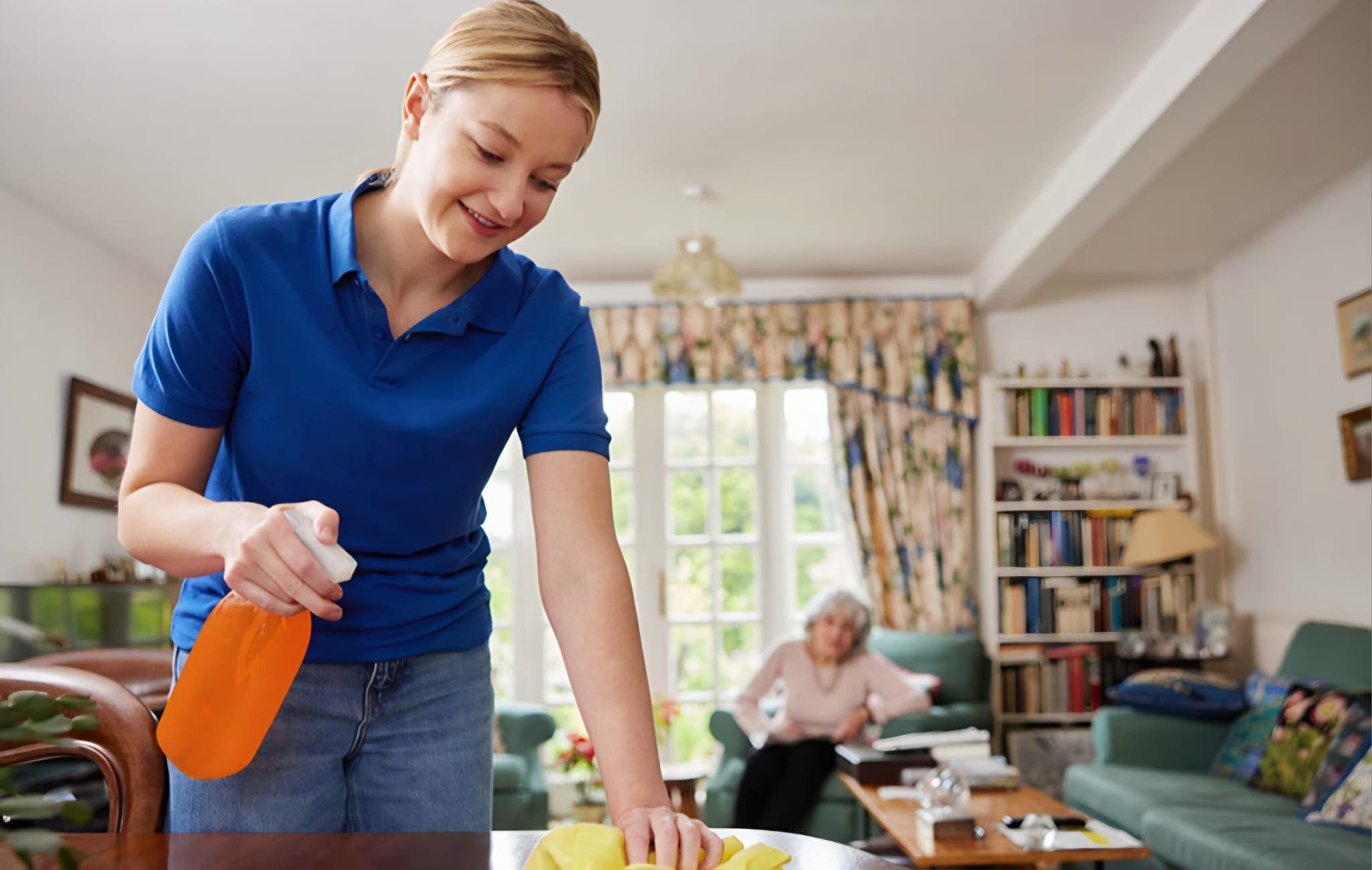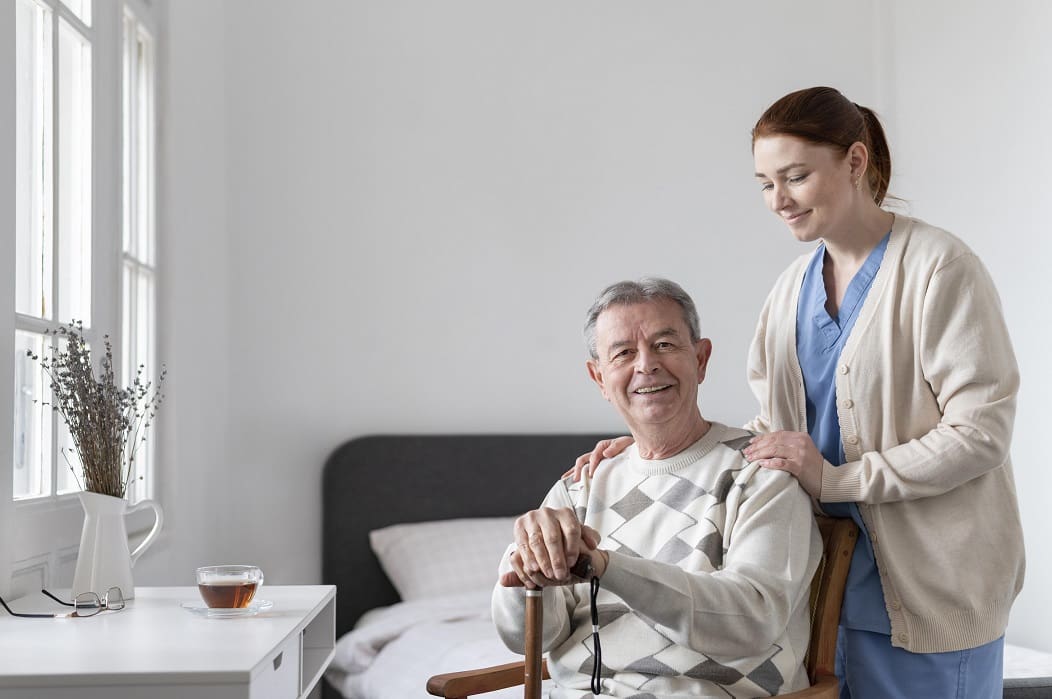
How a Caregiver-Based Cleaning Service Creates a Safe Space for Seniors
January 5th, 2026Caregiver job, Caregiver Service, Caregiver Services, caregiver support, caregivers, Cleaning Services, Companion Caregiver,
Highlights
- A caregiver-based cleaning service combines professional cleaning with care.
- These services focus on safety, comfort, health, and dignity, not just cleaning tasks.
- Clean and clutter-free homes help seniors reduce fall risks and avoid common household accidents.
- Caregivers identify and remove hazards like loose rugs, spills, poor lighting, and cluttered walkways.
- Proper cleaning helps seniors save their energy for important daily activities like cooking, walking, and socializing.
- Bathrooms and kitchens receive special care since they are high-risk areas for slips and falls.
- Gentle, senior-safe cleaning products are used to prevent breathing issues and skin irritation.
A clean-living space is essential for everyone, especially seniors and individuals with disabilities. For many seniors and physically disabled people, home is where all their best memories live. However, handling a busy routine, offering effective support for the senior member, and cleaning the home may not be possible for everyone, but it is essential.
That’s why caregiver-based cleaning services in Farmington, CT, have become popular. The experts not only clean homes but also offer effective care and support for seniors and people with disabilities. It builds a bridge between a clean house and a healthy, happy life.
In this blog, we will dive deep to explore how these services work, why they are so helpful for seniors and people with disabilities, and how they create a safe space.
What is a Caregiver-Based Cleaning Service?
Our janitor cleaning service is much different from traditional cleaning services. Regular cleaners dust, scrub, and vacuum. They move fast and leave quickly. But the story is not the same with caregiver-based cleaning services. It is a combination of home care and housekeeping. It ensures the environment is spotless and the person living there is safe and respected. Our expert caregivers don’t just see a messy kitchen; they see a senior or a physically disabled individual who may be struggling to reach the top shelf.
The primary goal of our caregiver-based cleaning services is to offer perfect care to seniors and create a safe space for them.
Why a Safe Home Matters for Seniors
A clean & safe home is most essential for them. As people age, they may face issues, such as poor balance, weak muscles, vision problems, and health conditions. Even spills or clutter can lead to serious falls. They also suffer from breathing problems due to excessive dust in the living room. A clean room helps seniors stay independent longer, feel relaxed and confident, avoid injuries and illness, and enjoy daily life more.
The Role of Caregiver-Based Cleaning Services in Creating a Clean and Supportive Space
- Reducing the Chances of Falls:This is one of the biggest worries with seniors and people with wheelchairs. A stray rug, a slippery floor, or clutter in a hallway can lead to an accident. Our caregivers know exactly what to look for. They don’t just clean the floor; they clear the path.
- Managing Energy:If a senior spends all their energy in cleaning a bathroom, they may be too tired to enjoy a healthy meal or go for a walk. By opting for our janitor cleaning services, you can give your loved one extensive care and help them manage their energy throughout the day.
- Prioritizing Health & Hygiene:A dusty home can cause breathing problems, especially for senior members. Germs and bacteria in the kitchen and bathroom can lead to sickness. Our professionals provide a deep cleaning to maintain all the essential spaces healthy and hygienic.
- Making the Individual Comfortable:We are not limited to cleaning the home, and you know it. Our experts provide companionship to the senior members to make them feel comfortable and fight against loneliness. This is highly essential for older individuals.
- Using Gentle & Safe Cleaning Products:Strong chemicals can be harmful to seniors. A caregiver-based cleaning service often uses gentle, safe products. Our experts use solutions that lead to less breathing trouble, no strong smells, and safer surfaces.
What to Expect from Professional Caregiver-Based Cleaning Services?
If you have any doubts about our janitor cleaning service, no need to go anywhere. Here’s what you can expect:
- Decluttering Spaces:Our expert caregivers help declutter the spaces that your loved one uses the most. If many items aren’t in use anymore, our professionals set them aside and organize them strategically so the senior member doesn’t face any problems.
- Cleaning High-Traffic Areas:The bathroom and kitchen are the most used rooms in a house. They are most dangerous for seniors and individuals with limitations because of water and spills. Our experts ensure that the mats are non-slip and secure. They also remove spills and grab bars for safety.
- Lighting the Way:As people age, they face the most difficulties in walking. Our expert caregivers check if light bulbs are burnt out or if a lamp cord is stretched across a walkway where someone could trip. This will help ensure safety for your loved one.
How It Helps the Family
If you are a son or a grandchild of a senior, you probably worry about them. You want to keep the living spaces clean, but you also want to spend your visits not working. When a family hires a caregiver-based cleaning service, it takes the pressure off everyone.
- Quality Time:Instead of spending your Saturday scrubbing your grandmother’s floors, you can spend it looking at old photos or going to the park with her.
- Peace of Mind:You can sleep better knowing that a professional has checked the house for hazards and that your loved one is in a clean, healthy environment.
How a Caregiver-Based Cleaning Service Provides Emotional Support to Seniors
Caregiver-based cleaning services are not limited to cleaning spaces; we offer much more than ordinary cleaning:
- Engaging in Friendly Conversations:Our expert caregivers not only clean surfaces but also engage in friendly conversations. They make sure the senior person feels comfortable. They also provide perfect companionship to your loved one so they cannot deal with loneliness. Having someone to look forward to seeing can change a senior’s entire mood for the week.
- Reducing Stress & Anxiety:Have you ever felt nervous when your room is a mess? For seniors, a messy house can feel even more overwhelming. Knowing that the laundry is done and the dishes are clean helps a senior relax. Seniors often worry about things they can no longer do. When a caregiver handles the cleaning, that worry disappears, leaving the senior feeling light and happy.
- Boosting Confidence & Dignity:It can be hard for seniors to admit they need help. A caregiver-based cleaning service handles this with a lot of respect. When the house is clean, seniors feel proud to invite friends or family over. This helps them stay social instead of hiding away because they are embarrassed by a mess.
- Creating a Sense of Routine:For many people, especially those who may have trouble remembering things, a routine is very comforting. Knowing that “Tuesday is cleaning day” gives seniors something to count on. This structure helps reduce confusion and makes the world feel like a safer place.
- Acting as a Safety Net:Because our cleaners are also trained caregivers, they notice small changes that a regular cleaner might miss. They may see that a senior isn’t eating as much or seems more tired than usual. When you know a caring professional is checking in, you feel less stressed, too. That calm feeling often rubs off on the senior!
Caregiver Training & Safety Standards
As part of our commitment to senior safety and quality care, all caregiver-based cleaning professionals must complete mandatory training before assignment. This ensures every service meets strict safety, hygiene, and care standards.
Access the mandatory training here:
https://polishcareservices.com/training
A caregiver-based cleaning service plays a key role in creating a safe space for seniors. It helps prevent falls, supports good health, reduces stress, and keeps homes comfortable. Most of all, it brings care and kindness into everyday cleaning. If you or your loved one wants to age safely at home, a caregiver-based cleaning service can make that journey easier and brighter.

What is the Difference Between Live-In and Hourly Home Care?
November 21st, 2025Caregiver Agency, caregiver support, Companion Caregiver, Home Care, Homecare, Senior Care Services, Senior Services,
Do you have elderly seniors or immobile family members? Then you must know the importance of working with a home care agency. But it is really complicated to find the right kind of support. It takes a bit of heart and a lot of patience.
Families may come across two main choices — Live-In Home Care and Hourly Home Care. Both are supportive, both promise comfort. But they work in different ways.
Sometimes it is hard to see which one truly fits your situation until you understand what daily life looks like under each plan. And if you mistakenly make the wrong decision, it may have a negative impact.
But do not worry! As a well-known and trusted home care agency that serves multiple areas across Connecticut and Florida, we have come up with this blog. Here, you will be enlightened about each type of non-medical caregiver services and their nuances. So, before choosing one, you know what will go best with your situation.
But before anything, you have to understand what home care and caregiver services mean. So, you can better learn about what you will get out of this support.
What Home Care Services Mean in Connecticut and Florida: A Simple Overview
We know how important it is for seniors to stay in a familiar space surrounded by their memories. Home care helps such people live safely and comfortably in their own homes rather than moving into a facility.
Our caregivers provide what is known as non-medical support. This support may include help with:
Bathing (in Connecticut only)
Meals
Light cleaning
Companionship
Mobility assistance (in Connecticut only)
As a registered homemaker companion agency, our caregiver services across Connecticut and Florida will help your loved ones live with more confidence. But before you choose a service, you need to understand what each type of care really means.
What Does Live-In Home Care Services Offer? Why is it Important?
Live-in care means a non-medical caregiver stays in the home during the day and overnight, but this service cannot be 24/7. The caregiver must receive sleep time and breaks by law.
Live-in care is available only in Connecticut. Florida does not allow live-in care. In Florida, families may choose hourly or 24/7 care through rotating caregivers.
In a live-in setup, the caregiver receives a space to rest and sleeps when the client sleeps. Usually, the same caregiver or two rotating caregivers manage the support.
When Live-In Care is the Best Choice (CT Only)
Live-in care is a good choice if your loved one:
Wakes up at night or needs more frequent assistance.
Lives alone and feels unsafe without company
Needs help with most daily activities
Has Alzheimer’s, Dementia, or memory challenges and needs consistent non-medical supervision
Live-in caregivers provide both non-medical care services and emotional comfort. This option will get them a trusted companion who is always there.
What’s Included in Live-In Care?
It generally covers:
Daily non-medical personal support
Meal planning and light cooking
Mobility help and transfer assistance
Housekeeping and laundry
Companionship and emotional care
Help with appointments and medication reminders
Reasons to Hire a Live-in Caregiver
When you hire live-in care, you get daily support for your loved ones. Here’s what families often tell us:
Someone is always around, so your loved one is never alone or worried about being by themselves.
Nights are easier. If they wake up or need help, the caregiver is right there to check on them.
Families worry less. You don’t have to keep calling or driving over to make sure everything’s fine.
Care feels personal. It’s not a different person every few hours. It is one caregiver who learns your family’s routine and fits in naturally.
Home stays the same. They keep their own space, their things, their memories. Nothing has to change.
They get a real companion. Someone to talk to, share meals with, or just sit with during quiet moments.
Everyone sleeps better. You know they’re safe, comfortable, and cared for. It’s simply peace of mind.
If you search for live-in caregiver support in Connecticut for an elderly person, contact us. Our caregivers have gone through background checks, reference verification, and hands-on practice.
In Florida, this option is replaced with hourly or 24/7 care because live-in is not permitted.
What is Hourly Home Care? What Are Its Benefits?
The main reason is getting support when you need it most. Hourly home care gives you flexibility. Instead of someone staying all day, you get a caregiver who visits for set hours.
You can also choose hourly overnight support, which usually runs for 8 to 12 hours.
Families who use this type of care generally have someone living with their loved one already, but need extra help during busy hours. If you look for hourly caregiver services in Connecticut or Florida, you may trust our agency to find the right fit. If you want to know more about us and how we can support your loved ones, you can directly call us at 8602558278 (for CT) or 941-212-0310 (for FL).
Hourly Care Might be Best If:
You only need a few hours of help per day
Your loved one is mostly independent
You already provide some care and just need breaks
You want a budget-friendly plan with no overnight stays
You want overnight support without live-in care
What is Included in Hourly Caregiver Services?
Hourly caregiving is meant to make everyday life easier, safer, and less stressful for both seniors and families. The services usually cover the most common daily needs:
Personal care and hygiene support (CT only)
Meal preparation and light kitchen help
Medication reminders to keep track of daily routines safely
Mobility help, like walking assistance, moving between rooms, or gentle exercise support (CT only)
Light housekeeping
Companionship and conversation to prevent loneliness or isolation
Transportation and errands
Respite care
Flexible scheduling
Overnight hourly shifts (8–12 hours)
In Florida, caregivers offer non-medical support such as companionship, meal help, errands, supervision, and reminders. They cannot touch, bathe, lift, or transfer clients.
The Benefits of Hiring an Hourly Caregiver
Here’s why families across Connecticut and Florida often prefer hourly care:
You stay in control of the schedule
You pay only for the hours you use
It keeps daily routines balanced
You get rest and peace of mind
Your loved one keeps their independence
It is a gentle step before considering full-day coverage
You know who is entering your home
According to a study, more Americans are turning 65 every year, and by 2030, all baby boomers will be older than 65. Hopefully, now you understand the importance of caregivers for seniors and older adults living in homes.
Live-in vs. Hourly Home Care Solutions: What to Choose?
It will not be right if you differentiate between these two services in terms of time only. It’s about lifestyle and the level of support your near and dear ones need.
In live-in care (for the Connecticut area only), the caregiver becomes part of the household. They are there to help when there is a need during the day. There’s security, consistency, and emotional comfort knowing someone is always around.
In hourly care, caregivers come for a fixed schedule — say, 8 a.m. to noon or 4 p.m. to 8 p.m. It gives you flexibility without paying for hours you don’t need.
Though both options cover different aspects, their focal aim is the same: keeping your loved ones independent and cared for in their home. If you still want to choose one of them, you may consider the following aspects:
How much help is truly needed?
Is someone at home already?
How independent is your loved one?
Budget and coverage
Home setup and space
The emotional comfort needed
Family involvement
Sometimes, you will not know the right answer right away, and that’s fine. We have seen families try one option, then adjust later as needs change. The most important thing is to start with the care support needed right now.
Wrapping Up!
Both live-in and hourly care give families relief and seniors dignity. One gives full day and overnight presence with breaks, and the other gives flexible support.
We believe non-medical personal care solutions should be warm, kind, and personal. That’s why our caregivers follow routines, connect, and listen. They make sure your loved ones never feel alone.
If you are unsure which care type is right, we can talk through your needs. Because this is not just about hours and schedules, but comfort, safety, and peace.

Activities for the Elderly to Keep Healthy and Happy
October 10th, 2025Activities for Seniors, Activities for the elderly, Caregiver Agency, Caregiver Services, caregiver support, Elderly Care,
As we age, maintaining our physical and mental well-being becomes increasingly important. Engaging in regular activities not only keeps the elderly fit but also enhances their overall happiness. This article provides an assortment of enjoyable and beneficial activities tailored for older adults. We’ll explore various forms of exercise, social engagement, and hobbies that can contribute to a healthy and fulfilling lifestyle.
- Physical Activities
Walking and Hiking
One of the simplest yet most effective activities for seniors is walking. It’s a low-impact exercise that can be done almost anywhere—be it outdoors in a park or indoors at a mall. Regular walking helps improve cardiovascular health, enhances mobility, and elevates mood. For those who enjoy nature, hiking can be a wonderful option. It combines exercise with the tranquility of the great outdoors, adding an element of adventure and exploration.
Yoga and Tai Chi
Both yoga and tai chi are excellent options for elderly individuals seeking to improve flexibility, balance, and strength. These gentle forms of exercise are low-impact yet highly beneficial, aiding in coordination, reducing stress, and enhancing mental clarity. Many community centers and local gyms offer classes specifically designed for seniors, making it easier than ever to get started.
Strength Training
Incorporating strength training into a weekly routine is crucial for maintaining muscle mass and bone density. Many seniors might feel intimidated by weightlifting, but there are safe ways to strength train without heavy equipment. Resistance bands and light weights are great for improving strength, and chair exercises can make these activities accessible for those with limited mobility.
- Social Activities
Group Classes and Clubs
Social interaction is vital for emotional well-being, especially for the elderly. Participating in group classes—such as art, cooking, or dance—can help foster new friendships and combat loneliness. Many communities have clubs or organizations designed for seniors, providing opportunities for bonding over shared interests. Whether it’s a book club or a chess team, engaging in these activities can make a significant difference in mental and emotional health.
Volunteering
Giving back to the community can instill a sense of purpose and fulfillment in seniors. Volunteering allows elderly individuals to share their skills and knowledge while connecting with others. Whether it’s helping at a local food bank, offering tutoring services, or participating in community events, volunteering can help seniors feel actively involved in society and valued.
- Cognitive Activities
Puzzles and Games
Keeping the brain active is just as important as maintaining physical health. Engaging in puzzles, crosswords, and brain games can stimulate mental activity and improve cognitive functions. Board games and card games also offer a fun way to challenge the mind while providing social interaction. Many seniors find that participating in these activities sparks joy and can even enhance memory skills.
Learning New Skills
Learning doesn’t stop in old age; in fact, it can be a delightful pursuit! Seniors can take classes to learn new skills—like painting, playing a musical instrument, or even learning a new language. Many community colleges offer courses specifically designed for older adults. Challenging the brain with new skills can boost self-esteem and keep the mind sharp.
- Creative Activities
Arts and Crafts
Engaging in creative activities can be incredibly therapeutic for seniors. Arts and crafts are excellent for self-expression and can bring about feelings of accomplishment. Activities such as painting, knitting, or scrapbooking allow for creativity while also fine-tuning motor skills and hand-eye coordination. Community art classes are often available and can serve as a wonderful platform for socializing.
Gardening
Gardening is an enjoyable activity that can provide both physical exercise and mental enjoyment. Tending to plants can be very rewarding as it allows individuals to see the results of their efforts. Whether it’s planting flowers, growing vegetables, or maintaining a small herb garden, the act of gardening encourages physical activity, nurtures creativity, and can even lead to healthier eating habits.
- Mindfulness and Relaxation
Meditation and Mindfulness Practices
Incorporating mindfulness practices such as meditation can help seniors manage stress and anxiety. Setting aside time each day for mindfulness exercises, such as deep breathing or guided meditation, can significantly improve one’s mood and mental clarity. These practices promote emotional well-being and can enhance overall quality of life.
Music Therapy
Listening to music, playing an instrument, or participating in group singing can have therapeutic benefits for seniors. Music therapy has been shown to improve mood, reduce feelings of depression, and enhance cognitive function. Many nursing homes and assisted living facilities offer music programs, but seniors can also enjoy music in the comfort of their homes by creating playlists of their favorite songs.
- Balanced Nutrition
Cooking Classes
Nutrition plays a crucial role in maintaining health. Cooking classes tailored for seniors can provide knowledge about balanced diets and healthy meal preparation. Learning to cook nutritious meals can empower seniors to take control of their dietary choices, ultimately enhancing their overall well-being. Many organizations offer classes focusing on easy, healthy recipes that cater to the unique dietary needs of older adults.
Community Gardens
Participating in a community garden can be a fantastic way for seniors to learn about nutrition while engaging in physical activity. Community gardens not only promote healthy eating but also encourage social interactions among participants. Working together to grow fresh produce can create a strong sense of community and provide healthy food options for seniors.
Conclusion
Engaging in various activities is essential for elderly individuals to maintain their health and happiness. From physical exercises like walking and yoga to social interactions through group classes and volunteering, there are countless opportunities for seniors to stay active and fulfilled. Cognitive activities such as puzzles and learning new skills can keep their minds sharp, while creative outlets like arts and gardening allow for personal expression and joy.
Emphasizing mindfulness, nutrition, and social engagement can lead to a balanced lifestyle that promotes both physical well-being and emotional satisfaction. As seniors explore these activities, they’ll find not only improvements in their health but also an enriched quality of life. Ultimately, encouraging an active and fulfilling lifestyle will help elderly individuals thrive, fostering their health and happiness for years to come.
By incorporating these activities into their daily routines, elderly individuals can significantly enhance their overall well-being, ensuring they lead healthy, happy, and enriched lives. Embracing a variety of pursuits not only supports physical health but also nurtures social connections and stimulates mental engagement, paving the way for a vibrant and fulfilling lifestyle. As they explore and enjoy these activities, seniors can truly experience the joy of living actively and purposefully.
Credit Dane Michele for Polish Care Services a Caregiver agency for the elderly

Caring For An Elderly From Afar: How to Support a Parent You Can’t Always Be There For
June 24th, 2025Caregiver Agency, Caregiver Service, caregiver support, Home Care, In Home Care,
When someone you love needs more care than ever—and you live too far away to knock on the door—it can feel like your hands are tied, when you are Caring For An Elderly From Afar. But it does not need to be as overwhelming . Thanks to a wave of practical tech and service options, long-distance caregiving has become something you can manage proactively, thoughtfully, and with real peace of mind. This isn’t about replacing presence with gadgets. It’s about staying present in new ways, with tools that extend your reach and voice across the miles.
Emergency Response
One of the first things you worry about? What happens if something goes wrong and no one’s there. That’s why finding a top-rated fall detection system is a non-negotiable starting point. These setups do more than buzz for help, they detect motion, sense impact, and alert emergency contacts without the need to press a button. Some even track location changes
and unusual patterns, so you get a heads-up before it becomes a headline. When seconds count, these tools deliver. No guesswork. Just action.
Companionship
Being alone too often isn’t just hard, it’s harmful. But tech has gotten kinder. Enter the new generation of digital presence: AI companions to help fight loneliness. These voice-driven systems talk, play music, remind about meds, even initiate check-ins based on routines. And this isn’t about faking family, it’s about creating rhythm, easing silence, and giving you another channel to listen through. A little presence goes a long way.
Home Safety
Sometimes safety looks like a locked back door. Or a hallway that lights up when footsteps hit the floor. That’s what smart sensors boost safety are for. Think appliance shut‑offs, voice‑activated lighting, even alerts if the stove stays on too long. You don’t have to redesign the house, just tune it to respond better. The right upgrade can feel like a second set of eyes.
Doctor Access Medical help shouldn’t hinge on someone driving across town. With available telehealth options, your loved one can see their doctor on a screen, send secure messages, and manage prescriptions without ever leaving the couch. These platforms aren’t just convenient, they’re clarifying. You stay in the loop. They get care when it matters. And you both sleep easier.
Location Tracking
Wandering is rare until it’s not. A single afternoon out of bounds can shift everything. If you’re worried, check out whether GPS tracking is worth it for your situation. These devices can send real-time location alerts, trigger notifications if boundaries are crossed, and let you know someone made it home. Freedom matters, but so does knowing when freedom starts to fray.
Financial Clarity
Money talk gets messy, fast. Especially when siblings share caregiving duties across state lines. Tools like shared spreadsheets help, but finding a free budget template online makes things less abstract. It gives you something concrete to point at. You’ll still need conversations, but now they’ll start with numbers, not feelings.
Caregiver Support
Sometimes the signs aren’t loud. They’re quiet. Missed meals. Clothes worn backward. Conversations that repeat like clockwork. That’s when it might be time to explore in-home support, even just a few hours a day. Services like Polish Care Services can step in gently—offering companionship, personal care, and daily help that respects independence while adding structure. It’s not surrendering control—it’s keeping things steady before they spiral.
You don’t need to do it all. But you do need to stay connected, to people, to routines, to the little red flags that pop up when something shifts. Tech won’t love your parent the way you do. But it can help you show up, stay close, and make the distance feel smaller than it is. That’s the goal.
Credit: Denise Long
